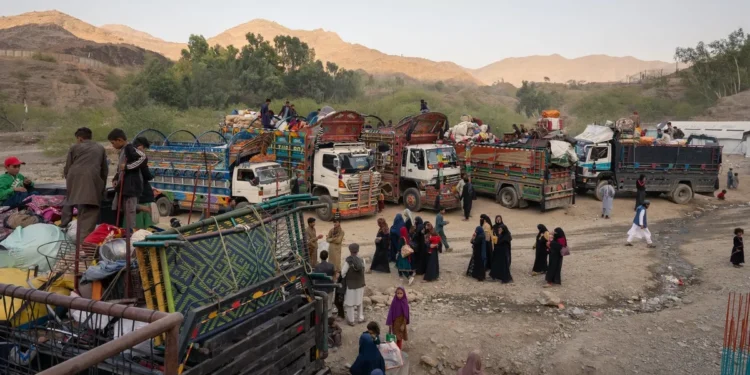As 2023 came to a close, Pakistan’s decision to expel illegal immigrants, particularly its repatriation plan affecting Afghan refugees, stood as a significant geopolitical and humanitarian concern. This policy, known as the Illegal Foreigners Repatriation Plan, sparked widespread worry and had profound consequences, impacting both individuals and regional stability.
In early October, the caretaker government unveiled the mass deportation plan, ostensibly applicable to all illegal foreigners but appearing to disproportionately target undocumented Afghans. Pakistan, home to an estimated three to four million Afghan refugees and migrants, initiated these deportations by the end of the month, forcing many to return to their crisis-wracked home country within an unusually short timeframe.
The urgency and scale of these repatriations, with reports of tens of thousands heading for the border, underscored the dire situation many Afghans faced. By December 20, approximately 440,124 Afghans had been repatriated to Afghanistan, according to state media.
As the year progressed, the policy’s implementation revealed a complex tapestry of motivations and consequences. The government cited security concerns, particularly the threat from the banned Tehreek-i-Taliban Pakistan, as a key driver. These expulsions followed terrorist attacks in Balochistan and Zhob, contributing to a strained relationship between Pakistan and the Taliban regime in Kabul.
The human toll of the expulsions was stark. Many Afghans, including those with valid documents, fled Pakistan to escape police harassment. Reports of authorities confiscating migrants’ money exacerbated the difficulties these individuals faced upon their return, thrusting them into deeper poverty and vulnerability.
Internationally, the situation drew criticism and concern. Humanitarian organizations, foreign governments, and rights groups urged the government to reconsider its approach, highlighting the policy’s potential to violate international law and principles, particularly the principle of non-refoulement.
The historical role of the US and Britain in shaping Afghanistan’s trajectory cannot be overlooked. Their failure to resettle the Afghans they had pledged to take in has exacerbated the crisis, leaving many Afghans in a state of precarious uncertainty.
On the Afghan side, the Taliban’s response highlighted the difficulties of managing the sudden influx of returnees. Afghanistan, already grappling with a severe humanitarian crisis, found itself ill-prepared to accommodate and support the large numbers of returning Afghans.
As the expulsions continue, the realities faced by returning Afghans are grim. For many, Pakistan was more than just a refuge; it was a home where they had lived for decades, and their forced return to Afghanistan represents a disconnection from their lives and communities.
The situation also has broader implications for regional stability, potentially fueling further displacement and migration. The policy’s potential to drive individuals towards criminality or armed opposition raises serious security concerns. As the world steps into the new year, the future for Afghan migrants, both within Pakistan and those repatriated, remains uncertain.
The international community’s role in addressing this crisis, through diplomatic efforts, humanitarian aid, and resettlement programs, will be crucial in shaping outcomes. This situation serves as a poignant reminder of the enduring moral responsibilities accompanying geopolitical decisions and their long-lasting impacts on human lives.
















